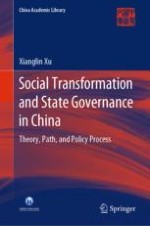2020 | OriginalPaper | Buchkapitel
11. Structural Restraints and Institutional Innovation in Local Governance
verfasst von : Xianglin Xu
Erschienen in: Social Transformation and State Governance in China
Verlag: Springer Singapore
Aktivieren Sie unsere intelligente Suche, um passende Fachinhalte oder Patente zu finden.
Wählen Sie Textabschnitte aus um mit Künstlicher Intelligenz passenden Patente zu finden. powered by
Markieren Sie Textabschnitte, um KI-gestützt weitere passende Inhalte zu finden. powered by
